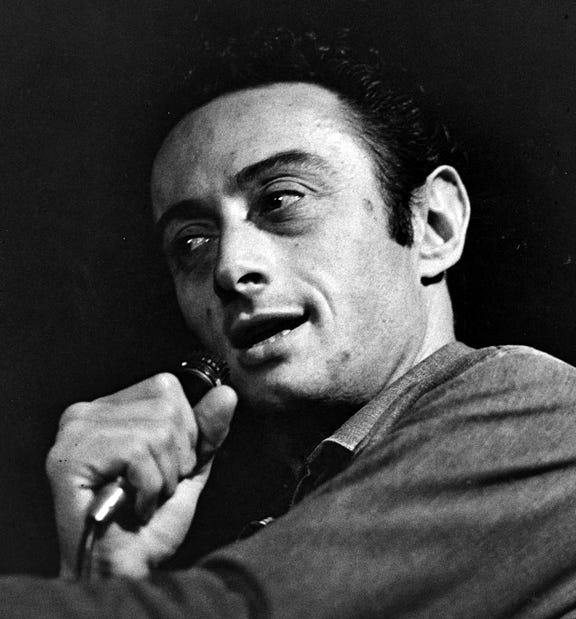We're All Gonna Die
Last week an Iowa constituent shared her fears about Medicaid cuts with her Senator, Joni Ernst, who replied: "Well, we all are going to die.” Ernst had veered so dark that she echoed a fictional version of Lenny Bruce, as conjured by Don DeLillo in his 1997 novel Underworld. The imagined Lenny riffs at the height of The Cuban Missile Crisis:
“We’re all gonna die!”
This cracked him up. He bent from the waist laughing and seemed to be using the mike as a geiger counter, waving it over the floorboards…
And the audience sat there thinking, How real can the crisis be if we’re sitting in a club on Santa Monica Boulevard going ha ha ha.
“We’re all gonna die!”
DeLillo channels Lenny’s voice into his own po-mo/no-mo vision.
“We’re all gonna die!”
Lenny loves the postexistential bent of this line. In his giddy shriek the audience can hear the obliteration of the idea of uniqueness and free choice. They can hear the replacement of human isolation by massive and unvaried ruin…
Lenny bent his knees and spread both arms wide, his mouth stretched in a rictus of gaped and grinning terror.
“We’re all gonna die!”
Underworld is an end of the century sized book, DeLillo’s tenth. He uses baseball, nuclear weapons and waste management to convey the cumulative weight of The Cold War over a span of decades. The book opens with The Shot Heard Round The World at the New York Giants' 1951 playoff win. In this fictional version, J. Edgar Hoover is in the stands and learns mid-game of the first Soviet test of the H-bomb. Paranoia ripples through the rest of the book, lingering like fall out.
Lenny’s been invoked in the past by artists ranging from Bob Fosse to Bob Dylan, sometimes as a free speech martyr, others as a doomed hipster. At heart, Lenny was a pathological provocateur, incapable of biting his tongue. He paid the price.
Among the different personas the real Lenny inhabited, the one through line was: Truth Teller. He spoke the unspeakable. During live sets you can hear the tension in the room as he whispers into the mic, confiding the actual truth to nightclub patrons, whose swinging evening just got eerily dark. That’s what DeLillo taps into, the mordant, doper sage, a beacon of hopelessness in the creepy optimism of mid-century America: “We’re all gonna die.”
“He loved this line so much that it was a little unnerving… An hour later, after all the bits, the scatological asides, the improvised voices, it was this isolated line that stayed in people’s minds when they went to their cars and drove home to Westwood or Brentwood or wherever, or roamed the freeways for half the night because they knew they wouldn’t be able to sleep and what better place to imagine the flash and burst, where else would they go to rehearse the end of history, or actually see it–this was the meaning of the freeways and always had been and they’d always known it at some unsounded level.”
Lenny was pegged by the press as a “sick comic,” a label he mocked by embracing.
His work is still transgressive, maybe more so. When Brandeis University acquired his archive in 2014, an accompanying performance of the play “Buyer Beware” by Michael Weller was promptly cancelled due to student outrage. Lenny had been ahead of his time on issues of race and sex, but he didn’t mince words, a pasttime college kids have made into a mission.
In the early 1960s Lenny’s performing career was killed, ostensibly by obscenity charges, but in reality by a conspiracy between outraged Catholic D.A’s. Some sixty years later the prudish young Jews of Brandeis silenced him again. Which is to say, the school that also houses the Lenny Bernstein archive treated Lenny Bruce like Leni Riefenstahl.
Lenny’s tombstone picnic is echoed in Senator Ernst’s recent mock apology. She doubled down on death in a video shot in a cemetery. Joni starts off ghoulish then swerves Evangelical for the climax:
“For those that would like to see eternal and everlasting life I encourage you to embrace my lord and savior Jesus Christ.” She speaks of Jesus like she owns him but is willing to share. No, thank you, Herr Senator. You and your ilk suggest that the arc of justice may in fact bend toward the morally dyslexic. Your ethos synchs up with the sick humor of Lenny Bruce, sans irony, as channeled through DeLillo’s suffocating paranoia:
“And so they drove half the night, at first morose and then angry and then fatalistic and then plain shaking scared, chests tight with the knowledge of how little it would take to make the thing happen–the first night on earth when the Unthinkable crept up over the horizon line and waited in an animal squat, and all the time they drove they heard the keening of that undisguisable Jewish voice repeating the line that had made them bust their guts laughing, astonishingly, only a few hours earlier.”










